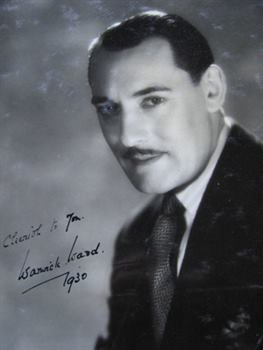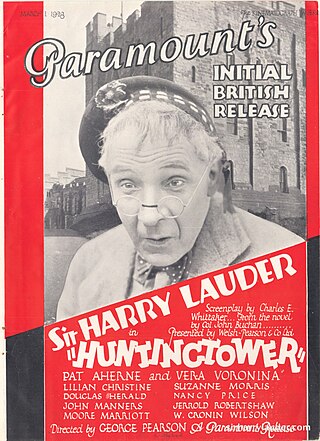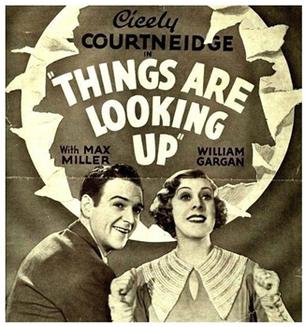English usually refers to:

The 1920s was a decade that began on January 1, 1920, and ended on December 31, 1929. In America, it is frequently referred to as the "Roaring Twenties" or the "Jazz Age", while in Europe the period is sometimes referred to as the "Golden Twenties" because of the economic boom following World War I (1914–1918). French speakers refer to the period as the "Années folles", emphasizing the era's social, artistic, and cultural dynamism.
Cecil Antonio Richardson was an English theatre and film director, producer and screenwriter, whose career spanned five decades. He was identified with the "angry young men" group of British directors and playwrights during the 1950s, and was later a key figure in the British New Wave filmmaking movement.
Movietone News was a newsreel that ran from 1928 to 1963 in the United States. Under the name British Movietone News, it also ran in the United Kingdom from 1929 to 1986, in France also produced by Fox-Europa, in Spain in the early 1930s as Noticiario Fox Movietone before being replaced by No-Do, in Australia and New Zealand until 1970, and Germany as Fox Tönende Wochenschau. An Indian version called Indian Movietone News ran in 1942 and 1943 before getting replaced by Indian News Parade.
Deadpan, dry humour, or dry-wit humour is the deliberate display of emotional neutrality or no emotion, commonly as a form of comedic delivery to contrast with the ridiculousness or absurdity of the subject matter. The delivery is meant to be blunt, ironic, laconic, or apparently unintentional.
Pathé News was a producer of newsreels and documentaries from 1910 to 1970 in the United Kingdom. Its founder, Charles Pathé, was a pioneer of moving pictures in the silent era. The Pathé News archive is known today as "British Pathé". Its collection of news film and movies is fully digitised and available online.
Phonofilm is an optical sound-on-film system developed by inventors Lee de Forest and Theodore Case in the early 1920s.
This is a chronological list of films produced in the United Kingdom split by decade. There may be an overlap, particularly between British and American films which are sometimes co-produced; the list should attempt to document films which are either British produced or strongly associated with British culture. Please see the detailed A-Z of films currently covered on Wikipedia at Category:British films.
President most commonly refers to:

The BFI National Archive is a department of the British Film Institute, and one of the largest film archives in the world. It was founded as the National Film Library in 1935; its first curator was Ernest Lindgren. In 1955, its name became the National Film Archive, and, in 1992, the National Film and Television Archive. It was renamed BFI National Archive in 2006.

Warwick Manson Ward was an English actor of the stage and screen, and a film producer. He appeared in more than 60 films between 1919 and 1933. He also produced 19 films between 1931 and 1958. He was born in St. Ives, Cornwall.
Thomas Bentley was a British film director. He directed 68 films between 1912 and 1941. He directed three films in the early DeForest Phonofilm sound-on-film process, The Man in the Street (1926), The Antidote (1927), and Acci-Dental Treatment (1928).

The Terror is a 1938 British crime film directed by Richard Bird and starring Wilfrid Lawson, Linden Travers and Bernard Lee. It was based on the 1927 play The Terror by Edgar Wallace. The play had previously been adapted as the American film The Terror(1928).

The Flying Squad, also known as Edgar Wallace's The Flying Squad is a 1940 British crime film directed by Herbert Brenon and starring Sebastian Shaw, Phyllis Brooks and Jack Hawkins. It was based on a 1928 novel by Edgar Wallace, which had been previously filmed under the same title in 1929 (silent) and 1932.

Huntingtower is a 1928 British silent adventure film, made at Cricklewood Studios. It was directed by George Pearson and starred Harry Lauder, Vera Voronina and Patrick Aherne. It was based on the 1922 novel Huntingtower by John Buchan. The film was fairly successful on its release.
British Instructional Films was a British film production company which operated between 1919 and 1932. The company's name is often abbreviated to BIF.
Chick is a 1928 British silent drama film directed by A. V. Bramble and starring Bramwell Fletcher, Trilby Clark and Chili Bouchier. The film was made at Islington Studios by British Lion. It was based on the 1923 novel of the same title by Edgar Wallace. It was remade in 1936 starring Sydney Howard in the title role.
The Man Who Changed His Name is a mystery play by the British writer Edgar Wallace, which was first staged in 1928. A young woman begins to suspect that her wealthy, respectable husband may be an escaped Canadian murderer.

Things Are Looking Up is a 1935 British musical comedy film directed by Albert de Courville, produced by Michael Balcon for Gaumont British and starring Cicely Courtneidge, Max Miller and William Gargan. It was made at Islington Studios by British Gaumont, an affiliate of Gainsborough Pictures. The film's sets were designed by Alex Vetchinsky. The film was distributed by Gaumont British Distributors.







